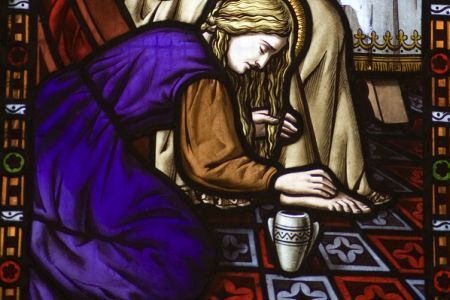Liz Curtis Higgs's Blog, page 15
December 4, 2013
The Women of Christmas: O Tidings of Comfort and Joy

Feeling a child moving inside you is indescribable. At first the sensation is faint, a mere flutter. Indigestion, maybe? No. You stand very still, holding your breath. There. Again.
Awe sweeps over you, as you press a loved one’s hand against your tummy. Here. Feel it? But only you can trace those tiny movements. In a few weeks that will change, but for now, this mysterious, miraculous gift from the Lord, this absolute proof of life, is yours alone to cherish.
It was different for Mary. She didn’t wait months for evidence that a child was growing inside her. She didn’t need an EPT or a fetal heart monitor or an ultrasound or a swift kick to her ribs.
Mary simply needed to visit her pregnant relative, Elizabeth, in “a town in the hill country of Judea” (Luke 1:39), called Ein Kerem. Strap on your best walking sandals, and let’s join them.

Read Chapter Four: O Tidings of Comfort and Joy
Read Luke 1:39-56
Breathtaking, to consider how far Mary traveled to see Elizabeth. Seventy, eighty, or one hundred miles, depending on the route she took south from Nazareth. A ten-day trek across some pretty barren landscape.
Elizabeth had no clue her young relative was coming, let alone that Mary was pregnant.
But the Holy Spirit knew. That’s why, “When Elizabeth heard Mary’s greeting, the baby leaped in her womb and Elizabeth was filled with the Holy Spirit” (Luke 1:41).
I get serious chills here. A woman—a woman—was filled with the Spirit of God! And that same Spirit spoke through Elizabeth “in a loud voice” (Luke 1:42), ”
Back in Nazareth Gabriel told Mary she was “highly favored” (Luke 1:28). Now her relative—“cousin” in some translations—said the same thing: “God has blessed you more than any other woman” (NCV).
I love this about Elizabeth. She didn’t sing out, “Look at me, I’m Sandra Dee,” and thrust out her sizeable baby bump. She didn’t say, “Let me tell you my good news.”
Oh no. She was far more excited about what was going on with Mary. And in Mary. Her next exclamation was a stunner: “Blessed is the child you will bear!” (Luke 1:42). Elizabeth discovered Mary was pregnant when the words poured out of her mouth. That was when Mary found out too. Woo hoo!

This classic painting is accurate as far as it goes, but in real life, these two women surely were lots more exuberant than this. I picture them exchanging first-century high fives and laughing until they couldn’t catch their breath.
“An angel—”
“I know! Me too!”
“And then he said—”
“I know! Me too!”
Can you imagine it?.Whatever their age difference, it no longer mattered—not when they had so much in common. They both believed in the Almighty. They both trusted his heavenly messenger. And they both had sons in their wombs because of God’s love.
Not simply his love for them, but even more, his love for us.
God sent John to prepare the way for Jesus. (Matthew 11:10)
God sent Jesus to prepare the way for us. (Hebrews 9:15)
Grace for Elizabeth, grace for Mary, grace for you, grace for me.
Elizabeth is overwhelmed, wondering aloud why God had so blessed her “that the mother of my Lord should come to me?” (Luke 1:43).
Read too quickly, and we might miss a big nugget of truth in this verse: “my Lord.” This was Elizabeth’s confession of faith—her “I believe that Jesus is the Messiah” declaration—and he wasn’t even born yet.
Oh my.
That’s not only having the faith of a child (Matthew 18:3). That’s having faith in a child.

Some of us struggle our whole lives to fully believe, to wholly commit, to truly call him Lord. We want proof, we want evidence, we want signs and wonders, we want miracles.
Show me, Lord.
So, he did. Christmas is God showing us who he is and why he came.
Immanuel—God with us—turns doubters into believers. It’s easier to resist a God you cannot see. But an innocent baby in a manger? An innocent man on a cross? Flesh-and-blood fact. Undeniable truth.
No wonder Elizabeth praised young Mary—still a child herself—for her childlike faith. “Blessed is she who has believed that the Lord would fulfill his promises to her!” (Luke 1:45).
Elizabeth believed what Gabriel told her husband. Mary believed what Gabriel told her in person. Maybe you’re thinking, “Lizzie, if an angel showed up and told me what God was going to do for me, then I would believe.”
Beloved, we have something these women did not have: the whole counsel of God captured between the covers of a book. Not on sacred scrolls stored in a synagogue, but in our purses, on our iPads, under our choir folders.

God’s Word is as affordable and available as a fast-food lunch, and a hundred thousand times more nourishing.
We also have something these women did have: the Holy Spirit. After four centuries of silence without angelic visits or prophetic utterances, the Holy Spirit was back in town in a big way.
When the Spirit filled Elizabeth, good news poured out. When the Spirit filled Mary, a magnificent song flowed forth, glorifying the Lord (Luke 1:46).
Now it’s our turn to let God fill us, to let God use us, to praise his name—not just during Advent, but every day until he comes to take us home.
From the Study Guide
In the end neither Elizabeth nor Mary is the star of this chapter; rather, the Holy Spirit takes center stage. In John 14:26 we learn that the Holy Spirit “will teach you all things.” In Acts 13:4 Barnabas and Saul were “sent on their way by the Holy Spirit.” And in Romans 15:13 we’re told we will “overflow with hope by the power of the Holy Spirit.” What role does the Holy Spirit play in your life?
I know, I know: a risky question, when so many churches offer different teachings on the Holy Spirit. So, here is what I ask: Be kind to one another. Build up one another. Encourage one another. Agree, rather than disagree. Be humble. Listen, rather than judge. Love one another. Honor God above all.
As for how I would respond to this question, God’s Word tells us, “When you believed, you were marked in him with a seal, the promised Holy Spirit” (Ephesians 1:13-14) Don’t you love that heavenly stamp of approval?
When I start to doubt, the Spirit is quick to restore my faith. When I’m tempted to snap out at someone, the Spirit tames my tongue. When I mess up big time, the Spirit convicts, gently but firmly. When I study God’s Word, it’s the Spirit that reveals Truth. If I manage to do something right, the Spirit deserves all the credit.
He is like the wind, which cannot be seen or grasped, yet exerts great power. He is God’s breath in us, and God’s gift to us. He is “love, peace, forbearance, kindness, goodness, faithfulness, gentleness and self-control” (Galatians 5:22-23). When you see those qualities in another believer, you’re seeing the Holy Spirit in action.
Now it’s your turn
Was there something in Chapter Four that really spoke to you?
What role does the Holy Spirit play in your life?
Kindly share your response under Post a Comment below. Your words truly matter and enrich our study together.
If you missed my earlier posts, you’ll find links to them below. Want your own copy of The Women of Christmas? You’ll find it here.
Can you believe we’re already halfway through our study? Thanks for reading, sharing, tweeting, posting, and encouraging your friends to join us!
Your sister, Liz

November 27, 2013
The Women of Christmas: The Virgin Mother Kind

She was young. So young. Far younger than the actresses who’ve portrayed her on screen, Mary of Nazareth was no more than twelve to twelve and a half years old. A preteen, an adolescent. That’s why our thoroughly modern Mary’s new Pinterest board includes a backpack, an electric guitar, and a pair of cool shades (love that royal blue).
Still, it isn’t Mary’s youth that makes her remarkable; it’s her courage. This innocent girl, this virtuous child, was willing to risk the shame of being pregnant out of wedlock, of being shunned by her neighbors, of being put aside by Joseph, if not stoned for adultery, all because an angel said, “God has a surprise for you” (MSG).
You’ll find a surprise waiting for you as well, wrapped inside Mary’s story.

Read Chapter Three: The Virgin Mother Kind
Read Luke 1:26–38
Elizabeth was six months pregnant, living in a suburb of Jerusalem, when “God sent the angel Gabriel to Nazareth” (Luke 1:26), an off-the-beaten-path kind of town in the Galilee region.
That same Gabriel had approached Daniel in a vision hundreds of years earlier. He “looked like a man” (Daniel 8:15), so, not huge with enormous wings, but still frightening enough that Daniel “was terrified and fell prostrate” (Daniel 8:17). Gabriel later came to Daniel “in swift flight” (Daniel 9:21), which surely took the man’s breath away.
Then, when Gabriel appeared before Zechariah in the temple, the angelic messenger announced that he stood “in the presence of God” (Luke 1:19).
Oh my. This is the heavenly creature who came to see our young Mary. Did she faint? scream? run for her life? No, she didn’t.
Mary trusted the One who sent Gabriel. She stayed. She listened.

“Greetings, you who are highly favored!” (Luke 1:28) Quite the opening line, isn’t it? Before Mary could grasp the full meaning, Gabriel assured her, “The Lord is with you.”
Now, here’s that surprise I promised you: Gabriel’s message for Mary is also God’s word for us. Because of the Son she would bear, we too are “endued with grace” (AMP) and “truly blessed.”
No, we won’t bear the Son of God, as Mary did. But when we’re born again, God places his Holy Spirit inside us. We are filled, as surely and as miraculously as Mary was: “Christ in you, the hope of glory” (Colossians 1:27).
Why me, Lord? That’s the question that overwhelms me, time and again. Why are you so good to me? Mary never spoke those words. She wanted to know how, but she didn’t ask why she was chosen.
We spend a great deal of time asking God why, when we already have the answer: love. He told his people, “I have loved you with an everlasting love” (Jeremiah 31:3). Every chapter of every book of the Bible demonstrates his love for us.
Mary knew she was loved. Do you? When I call you “beloved,” do you believe it?

I tried to find a stock photo that might express the word “beloved,” and stumbled on a whole series of close-up shots of this young woman’s mouth, all labeled, “The Lips Of My Beautiful and Beloved Girlfriend.”
Well.
To be honest, I found her teeth far more impressive than her lips. But to the man who photographed her, no lips held greater appeal. Truth is, it isn’t her mouth we find amazing; it’s her boyfriend’s boundless love for her.
We tell ourselves we aren’t worthy of God’s love and attention, that we’re nothing special. God begs to differ. “For we know, brothers and sisters loved by God, that he has chosen you” (1 Thessalonians 1:4).
Just like our Mary, you have “found favor with God” (Luke 1:30). God didn’t choose Mary because she was special. Mary was special because God chose her.
That’s the teachable truth in this chapter, the one thing I pray shines through. However astounding Mary’s bravery, humility, and obedience, God is the one who is to be honored and praised.

When Mary asked her one question—“How?”—Gabriel’s answer was, “The Holy Spirit will come on you, and the power of the Most High will overshadow you” (Luke 1:35). Even the word overshadow makes my stomach do a flip.
I’d have so many questions for Gabriel. When will this happen exactly? And where? How do I get ready? Will it hurt?
Mary asked none of those things.
So often we shower God with questions, demanding to know when our prayers will be answered, where he’s leading us next, and what we’re supposed to do in the meantime.
God isn’t wearied by our questions, but he is blessed when we simply take him at his Word and believe.
Gabriel gave Mary additional fuel for her faith, describing her pregnant relative, Elizabeth, “who was said to be unable to conceive” (Luke 1:36). Said to be. That’s the key. “No one thought she could ever have a baby” (CEV), but God knew better. The whole town called her “barren” (CJB), but God called her fruitful. “People said she couldn’t have a child” (GW), but God said, “Watch this.”

When Gabriel spoke the words we know as Luke 1:37, surely his fellow angels in heaven sang, “Glory, glory, glory to God in the highest!” Here are a half dozen translations. Read them aloud, if you can. Yes, right now. Let the truth sink in deep. These words weren’t meant only for Mary. They are also for you.
“For no word from God will ever fail.” (NIV)
“Nothing is impossible for God!” (CEV)
“There is nothing that God cannot do.” (GNT)
“Every promise from God shall surely come true.” (TLB)
“For with God nothing is ever impossible.” (AMP)
“God can do anything!” (NCV)
Mary’s response to this bold promise was sure and swift: “May your word to me be fulfilled” (Luke 1:38). Father God, let us be just as eager to say yes to you, just as quick to offer ourselves to you, just as willing to trust, to believe, to serve, to love.
From the Study Guide
How can we lay aside our doubts, our fears, our cynicism, and recapture our ability to take the Lord at his Word and trust him completely?
I’ve worded this question as “we,” but I need to get more personal than that: How can I lay aside my doubts and fears? By standing up to each one, moment by moment. Maybe because I’ve been parked on Luke 1:37 for the last year, the enemy has been pummeling me with reasons to doubt God’s power, God’s sovereignty, even God’s existence. He’s been throwing tiny pebbles, not rocks—not enough to kill my faith or even wound it—but enough to be a nuisance.
In those doubtful, fearful moments, I step back and let God bring to mind the Scriptures I’ve stored in my heart. Many are The 20 Verses You Love Most. Others are favorites from my spiritual childhood, memorized three decades ago. I remind myself that, because God is with me, then like Gabriel, I stand in his presence. God will fight the adversary for me and God will, absolutely, win.
Now it’s your turn
Two simple questions:
Was there something in Chapter Three that impacted you?
What would it take for you to say with all your heart, as Mary did, “I live to do God’s will”?
Kindly share your response under Post a Comment below. As you know from reading various quotes sprinkled throughout The Women of Christmas, I cherish your words and the encouragement you offer one another.
If you missed my earlier posts, you’ll find links to them below. Want your own copy of The Women of Christmas? Here’s the best price I found online this week.
Bless you for making time to study God’s Word together during this busy season. Our next chapter is my editor’s favorite. I hope you’ll find it meaningful as well.
Your sister, Liz
P.S. You can watch me teach this chapter, recorded live, in the closing segment of Christmas at the Farm. Just start the video on my website page, then move the playback slider ahead to 53:45. When time permits, I hope you’ll watch the whole webcast and hear Ann Voskamp share from her heart about The Greatest Gift. We had so much fun. Thanks for joining us!


November 20, 2013
The Women of Christmas: Let All Mortal Flesh Keep Silence

Hard to say which is more difficult—being patient or being quiet. Elizabeth spent a lifetime waiting, hoping, praying for a son. Month after month, year after year, the only thing that grew inside her was more patience.
When the happy day came and her prayers were answered, she kept the news of her pregnancy to herself, not shouting it from the hilltops, not even venturing past her door for five long months of quiet seclusion.
Wow.
Elizabeth surely had “the unfading beauty of a gentle and quiet spirit, which is of great worth in God’s sight” (1 Peter 3:4). If, like me, your tendency is to be impatient and anything but quiet, let’s see what we might learn from our first-century sister.
And do take a look at Elizabeth’s very own Pinterest board in beautiful burgundy—always a flattering color on a mature woman.

Read Chapter Two: Let All Mortal Flesh Keep Silence
Read Luke 1:19–25
Elizabeth fell silent by her own choice. Zechariah fell silent by God’s choice. When her husband heard the good news spoken by the angel Gabriel and voiced his doubts, those were the last words Zechariah said for many months.
“And now you will be silent and not able to speak until the day this happens” (Luke 1:20), Gabriel told him. Many commentators believe Zechariah not only couldn’t speak, he also couldn’t hear, since the Greek word kophos is also translated “deaf,” and later his friends spoke to him with their hands (Luke 1:62).
So. No sound, no speech.
Punishment for his sin of unbelief? No. This was the proof Zechariah had asked for. His advanced age and Elizabeth’s barren womb were no match for God’s power. The same God who took away his voice could assuredly give him a son.
Listen, beloved: God is not limited by our faith, nor hampered by the lack of it. Even if we don’t believe the promises written in God’s Word, they will still “come true at their appointed time” (Luke 1:20).
That’s what God was communicating to Zechariah back then, and to us right now.
You are not in charge. I am.

When Zechariah came out of the temple and into the waiting throng, “he could not speak to them” (Luke 1:22). They knew at once this wasn’t a throat problem. Their priest had clearly experienced a holy encounter in the temple and seen “something special from God” (NLV).
Zechariah would never be the same. Elizabeth was changed as well. When we come face to face with our Creator, he makes a dramatic difference in what we think, what we say (or don’t say), and what we do.
“After this his wife Elizabeth became pregnant” (Luke 1:24). A matter-of-fact miracle. No bells and whistles, no fanfare. In the silence of their bedroom, in the stillness of the night, a child was conceived by the grace and mercy of God.
Rather than tearing around their village of Ein Kerem, telling everyone their happy news, Elizabeth stayed home, “and for five months remained in seclusion” (Luke 1:24). Once again, our woman of Christmas was patient, quiet. Perhaps waiting for the quickening, that first noticeable movement in the womb.
A tiny flutter, yet a seismic shift for a mother-to-be.
My child is real. My child is alive.

When Elizabeth emerged from her self-imposed silence, she did so glorifying God: “The Lord has done this for me” (Luke 1:25). These are the words I want written across the pages of my life: “How kind the Lord is!” (NLT).
Elizabeth knew it wasn’t her righteousness that caused her womb to be filled.
It was God’s righteousness, God’s goodness, God’s kindness, God’s love.
Her words demonstrate Elizabeth’s maturity far more any wrinkles or age spots might show us. “Look what the Lord has done for me!” (ERV). Even the naysayers of the neighborhood couldn’t argue with her baby bump. “This is the Lord’s doing” (CEB), she told them.
God took away not only her barrenness, but also her heartache, her sorrow, and her shame.
Her story assures us of God’s ability to make all things new. His love fills us up and makes us whole. His mercy assures us our past is forgiven and forgotten. His power alters our present and guarantees our future.
Can you wait patiently, confident that God is at work in your life? Can you listen for his voice, rather than fill the air with your doubts? Can you say with Elizabeth, “How good the Lord is to me” (PHILLIPS)?
Those are the questions I’m asking myself this morning. Please, Lord, may I answer with all my heart, “Yes, yes, yes.”

From the Study Guide
Elizabeth spent all nine months of her pregnancy with a husband who could not speak or hear. In what ways might that lengthy silence have been a challenge for these two—individually and as a married couple?
We’re so accustomed to expressing ourselves with words that it had to be difficult for this couple to communicate only non-verbally. Facial expressions, body language, and hand gestures—all familiar after so many years of marriage—would have covered the necessities of life. Pass me the lentils. I’ll wash if you’ll dry. Can you get that itch in the center of my back? But volatile emotions could easily stay locked inside, and frustration might look more like anger building into rage, without any words of explanation to smooth hurt feelings.
And how might that silence have been an unexpected blessing?
Without words to get in the way, these two could really look at each other, letting their eyes speak for them. Touch would take on new significance. Intimacy would be heightened. Sounds are often a distraction, while silence lends itself to deep thoughts and long internal conversations. They would surely understand each other—and themselves—better after so many months of solitude, and emerge with a greater faith in God and deeper love and appreciation for each other.
If the Lord silenced you even for a day, what lessons might you learn?
Actually, the Lord once silenced me for several days with laryngitis. I quickly discovered that I talk too much and listen too little. I learned that unspoken prayers are still heard, and unspoken thoughts still help us make sense of what we’re experiencing. I was shocked to find that life went on amazingly well without my ongoing commentary. I also decided that my husband was even brighter than I’d realized, and that my children were more compassionate than I knew. I was almost sad when my voice returned. (My family probably was too, but they were kind enough to keep that under wraps!)
Now it’s your turn
Two simple questions this week:
Was there something in Chapter Two that stood out to you?
What might you discover if the Lord silenced you for a day?
Kindly share your response under Post a Comment below. As you know from reading various quotes sprinkled throughout The Women of Christmas, I treasure your words and the encouragement you offer one another.
If you missed my post on Chapter One, you’ll find a link below. Don’t have a copy of The Women of Christmas yet? Here’s the best price I found this week online.
Bless you for making time to study God’s Word together this busy season!
Your sister, Liz

P.S. Here’s your personal video invitation to join me online with Ann Voskamp for Christmas at the Farm: Unwrapping the Full Love Story of Christmas. Such a fun, encouraging hour! Our webcast will remain on both our websites for many seasons to come. Thanks for joining us!

November 13, 2013
The Women of Christmas: Let Every Heart Prepare Him Room

Imagine if Jesus knocked on your door this Christmas Eve, needing somewhere to stay. Would you have a spare bed to offer him, with clean sheets and fresh towels? Maybe a sofa with a warm blanket? How about a well-used futon from IKEA?
Or would you barely crack open the door, embarrassed, apologizing profusely. “Sorry, Lord. My place is a mess. And I really don’t have anywhere to put you…”
Right. So.
This holy season is about making room for Jesus. Welcoming him into our homes, our families, our lives. Flinging open the door to our hearts.
The women of Christmas did just that, lighting the way for us, showing us how it’s done. They anticipated the Messiah’s coming and longed for his appearing. They cradled God’s promises in their empty arms, knowing they would someday be filled.
They said yes. They waited. They trusted. This week, we’ll begin walking in their footsteps.
Come, Lord Jesus.

Read Chapter One: Let Every Heart Prepare Him Room
Read Luke 1:5–18
Elizabeth, our first woman of Christmas, descended from a long line of priests. She married one as well, and together they were “righteous in the sight of God.” But their neighbors had another word for this God-fearing couple: “childless.”
So. Hard.
In ancient Israel a woman’s worth was measured by how many sons she could provide for her husband. No sons? No value.
Oh my.
Elizabeth’s challenge back then remains ours right now: How can we stay faithful to God, even when our prayers seem to go unanswered? Whether we’re praying for a baby to hold or a job to keep the creditors at bay, whether we’re asking for our health to be restored or a broken relationship to be mended, we may sometimes wonder, “Is God listening? Does God care? Will he ever respond?”
The answers are certain: Yes, always. Yes, completely. Yes, in his perfect timing.

The angel Gabriel said to Zechariah, “Do not be afraid.” God is saying that to you as well, beloved. Fear not. I know the desires of your heart. I’ve heard your prayers. Trust me. I’ve got this.
Be assured, when God’s people prayed, “God heard them, for their prayer reached heaven, his holy dwelling place” (2 Chronicles 30:27).
Zechariah doubted. But we have no mention in Scripture that Elizabeth did.
Why did God wait until Elizabeth was older to give her a son? So the glory would be his alone. Miracles are God’s way of saying, “Watch this!” God wanted to be certain the whole world was paying attention.
People said Elizabeth was “unable to conceive” (Luke 1:36), yet God was more than able, more than willing to give her a son. Elizabeth continued saying yes to God. Then, when all was in readiness, God finally said yes to Elizabeth, according to his divine plan laid out before the world began.
That’s the whole of this chapter in a single word: Now.
Take a moment to read this week’s passage in The Voice, a unique translation that gives us a fuller picture of that time and place. Then, I’ll share my answers to one or more of the Study Guide questions featured in the back pages of The Women of Christmas. I’ll be right here when you’re ready…

From the Study Guide
1. Elizabeth is described as righteous, blameless, and honorable. Look through Proverbs 31:10–31, then choose the verses that best describe how a godly woman in biblical times might have lived out her faith in practical, day-to-day ways.
I’m already in trouble, since every verse in this familiar passage describes godly women through the ages! Here are just a few standouts that might suit Elizabeth:
A wife of noble character who can find? Proverbs 31:10
Even in days of old, such women were rare birds, putting character above all else. Rather than caring about how she looked to others, Elizabeth would have focused on what she did for others, taking care to always be above reproach.
Her husband has full confidence in her and lacks nothing of value. Proverbs 31:11
As a wife, she would have been trustworthy and generous to Zechariah, consistently delivering on her promises without emptying his coin purse.

She selects wool and flax and works with eager hands. Proverbs 31:13
Think of how rough these items would have been on a woman’s hands: freshly sheared wool (makes me itch to think about it), and flax plants that had to be soaked in stagnant water (ewww) to break down the fibers before they could be woven into linen. Yet Elizabeth would have done such taxing work with eager hands. Impressive.
She opens her arms to the poor and extends her hands to the needy. Proverbs 31:20
Elizabeth would have undoubtedly given generously to a first-century counterpart of World Vision, providing for those in greatest need. Even if we have no children living under our roofs, we can help care for the children of the world.
Charm is deceptive, and beauty is fleeting; but a woman who fears the Lord is to be praised. Proverbs 31:30
However old Elizabeth might have been, her fear of the Lord was never far from her thoughts, and her love for the Lord never faded from her countenance. While some may have looked down on her for her barrenness, God only looked down on her with love.

If you know a modern Elizabeth, what specific things does she do that you find exemplary?
Here’s the crazy truth: two women in my life come to mind who qualify as modern Elizabeths, and both are named…Elizabeth!
These women are both exceptional hostesses, opening their doors to friends and strangers alike. Both have homes that exude warmth, and purses that quietly open whenever an opportunity arises to give. Both honor their husbands and love them dearly, yet have lives of their own, spent serving others. And both women look really good in fine linen and purple!
How might these women from the past and present inspire you to change the way you’ll serve God in the future?
Sadly, I am not a confident hostess. I love being with friends, but am more likely to say, “Let’s meet somewhere,” rather than “Come to our place.” I’ve decided to (gulp) open our door once a week through December. Even if it’s hot chocolate from a box and cookies from Kroger, I’m going for it.
I’m also inspired by Elizabeth’s patience. After years of doing, doing, doing for God, I’m beginning to realize that simply waiting on the Lord pleases him even more. “Wait for the Lord; be strong and take heart and wait for the Lord” (Psalm 27:14).
Now it’s your turn
Two simple questions this week:
Was there something in Chapter One that struck a chord with you?
How does Elizabeth’s faithfulness inspire you?
Kindly share your response under Post a Comment below. I’ll be eager to read what you have to say!
Don’t have a copy of The Women of Christmas yet? Here’s the best price I’ve found online. Consider buying one for a friend and inviting her to join us. Or you might gather with several women for a Bible Study.
However you choose to enter in to this sacred season, I’m so glad we’re doing it together.
Your sister, Liz
Christmas at the Farm: Unwrapping the Full Love Story of Christmas
Watch our webcast anytime!

November 6, 2013
Bad Girls of the Bible: The Sinful Woman

We don’t know her name, her age, or her history. We know only that she was bad for a season. To be specific, she sold her body for money. Because her sinful lifestyle was common knowledge, people whispered about her, eyed her with disdain, avoided her company.
Except Jesus. He welcomed her touch. He met her gaze. He called her forgiven.

Chapter 10: I Beg Your Pardon
Luke 7:36-50
Here’s the story: Simon, a Pharisee, invited Jesus to a large public dinner. In the style of the day, the Lord reclined at a low table, propping himself up on his left elbow, eating with his right hand. His body was stretched out, his feet exposed. Aha.
Then “a woman who had lived a sinful life in that town” (Luke 7:37) showed up at Simon’s house. Make no mistake, she was “an especially wicked sinner” (AMP), “an immoral woman” (NLT). Her sins weren’t listed in detail because they didn’t need to be. The world’s oldest profession hardly requires a job description.
She came alone, bearing a small alabaster vial of perfume. Did she intend to give the Lord this “flask of ointment” (AMP), this “jar of fragrant oil” (HCSB)? Or did she mean simply to anoint his head, a common gesture of respect?
Whatever her plans, they flew out the window the moment she saw him.
Jesus.
Speechless, she drew closer, then “stood behind him at his feet weeping” (Luke 7:38). Little wonder. Tears often spring to my eyes when I sense the Lord’s presence. Tears of sorrow for my sins. Tears of gratitude for his goodness.
Perhaps she felt the same. Perhaps you’ve been there as well.

She cried so hard that “her tears began to wet his feet “(Luke 7:38 CJB). You know she must have been mortified. But she couldn’t stop her tears—not when her heart was filled to overflowing. She sank to her knees, then bowed her head so low it touched the ground.
Jesus didn’t pull away, didn’t scold her, didn’t make her feel foolish. No, he gladly received the baptism of her tears, recognizing this heartfelt expression for what it was—worship, pure and holy.
She could have used her sleeves to dry his tear-drenched feet. Instead, “she wiped them with the hair of her head” (NKJV). Far more personal, more humble, more sacrificial.
Our Bad Girl held nothing back now. She pressed her lips to his feet, “kissing them many times” (NCV). Not just once in shy affection, but “over and over again” (GW) with an abundance born of passion. It was customary to kiss a man’s hand or cheek or the hem of his garment. But this woman kissed his dirt-covered, stone-bruised feet.
Oh my. And she wasn’t finished yet.

Then she reached for her alabaster box, “and poured perfume” (Luke 7:38) on his feet—the same perfume she wore to advertise her services. So much for slipping under the radar at Simon’s gathering.
When Mary of Bethany anointed Jesus on a later occasion, “the house was filled with the fragrance of the perfume” (John 12:3). This anointing, though, was done in a different time and place, and performed by a very different woman. Not Mary of Bethany, and certainly not Mary Magdalene, who has yet to be introduced in Luke’s gospel and who was never called a prostitute anywhere in Scripture.
But this woman? Undeniably bad.
Simon the Pharisee had seen enough. He said to himself, “If this man were a prophet, he would know who is touching him and what kind of woman she is—that she is a sinner” (Luke 7:39). He was not only disgusted with this “social outcast, devoted to sin” (AMP), he was also unimpressed with Jesus.
If he were a prophet… Clearly Simon was not convinced.

Jesus knew the man’s thoughts, and so responded with a story about two men in debt to a moneylender. One owed a lot, one owed a little. Neither man could afford to pay back his loan, so the moneylender canceled their debts and “freely forgave them both” (Luke 7:42 AMP).
Don’t you love the Lord’s teaching style? Enter into their story, he beckons. Learn from their example.
When Jesus asked Simon, “Which of them will love him more?” (Luke 7:42), the Pharisee had no choice but to confess, “I suppose the one he forgave more” (Luke 7:43 HCSB). Too right, Simon.
The Lord affirmed the man’s answer, then turned toward our repentant Bad Girl, even as he continued speaking to Simon. This is my favorite part.
“Do you see this woman?” (Luke 7:44)
Simon saw a prostitute, period. He didn’t see her as a person, nor had he “noticed” (CEV) her acts of worship for what they were.
But Jesus missed nothing. He saw her. He saw her sordid past, her humble present, and her glorious future. He quickly described all the ways she’d honored him—unlike Simon—then finished with this startling announcement: “Her sins, which are many, are forgiven” (Luke 7:47 ASV).
All her sins? All are forgiven? Yes.
Why? “Because she loves much” (Luke 7:47 NLV).

We’ve called her silent adulation worship. What she really poured all over his feet was love. Her tears, her hair, her kisses, her perfume. Love, love, love, love.
In comparison, Jesus told Simon, “He who is forgiven little, loves little” (ESV). In truth, no one should fall into that category, because we’ve all been forgiven of a great many sins. All of us should be reduced to tears of gratitude. All of us should be on our faces before him.
Our Former Bad Girl understood that, which is why Jesus told her straight out, “Your sins are forgiven” (Luke 7:48). Not will be, not might be. Are.
The other guests began murmuring among themselves, as Jesus offered the woman a final word of assurance: “Your faith has saved you; go in peace” (Luke 7:50).
Peace? Yes, please. What woman doesn’t need more of that in her life?
She did not speak her faith—no verbal confession, no sinner’s prayer was recorded here—but she certainly demonstrated her love for a God who forgives completely. May we go and do the same. This week, this day, this hour.
Here’s this week’s question:
How can we know, as surely as this woman did, that our sins are forgiven?
God’s Word declares that truth, again and again, like a shower of kisses: “Blessed are those whose transgressions are forgiven, whose sins are covered” (Romans 4:7).
Then in the next chapter, “God demonstrates his own love for us in this: While we were still sinners, Christ died for us” (Romans 5:8).
Need more? “In him we have redemption through his blood, the forgiveness of sins, in accordance with the riches of God’s grace that he lavished on us” (Ephesians 1:7-8).
Forgiven. The word is written on our foreheads and etched across our hearts. It’s genuine, true, a finished work. I may not always feel worthy of his forgiveness, but that doesn’t change the fact of it: “Your sins have been forgiven on account of his name” (1 John 2:12).
Done. Thank you, Jesus.
Now, it’s your turn
How can you know, as surely as this woman did, that your sins are forgiven?
Kindly take a moment to post your Comment below. Your sisters and I would love to hear from you, learn from you, pray for you.
And do take a quick look at The Sinful Woman’s amber Pinterest board. I hope you’ll find her visual story inspiring!
Next week we’ll begin our new Bible study series, The Women of Christmas, carrying us right through December 31. I hope you’ll be reading along with us. Don’t have a copy yet? Here’s the best price I found online. Think about buying one for a friend and inviting her to join us. Or you might gather with several women for a Bible study:
How to Use the Women of Christmas as a Bible Study.
However you wish to enter into this sacred season, I’ll be here for you every Wednesday, beloved. I can hardly wait to turn to page one!
Your sister, Liz

Christmas at the Farm: Unwrapping the Full Love Story of Christmas
Watch our webcast, anytime!

October 30, 2013
Bad Girls of the Bible: Michal

Was she as pretty as a princess? Or a royal pain in the neck?
Anyone’s guess on the first. Apparently yes on the second.
As the daughter of King Saul, Michal might have enjoyed a life of privilege. Yet her story was a sad one and, for at least one moment in Scripture, a bad one.

Chapter 9: Out of Step
1 Samuel 18:1-30, 19:1-18, 2 Samuel 3:13-16, and 6:12-23
When we first meet Michal, she has fallen in love with a handsome young musician named David. “When they told Saul about it, he was pleased” (1 Samuel 18:20). In fact, her father “rubbed his hands in anticipation” (MSG).
Because he wanted David for a son-in-law? Oh no.
Because he wanted David dead. The young man was too popular, too applauded, too praised. Saul’s ego couldn’t bear it another minute.
He realized Michal might serve as “a snare” (1 Samuel 18:21) to David, “a stumbling block” (DRA), “a trap” (NCV), neatly set so the Philistines could “kill him” (CEV).
What was Saul’s problem? Jealousy. God’s favor was clearly on David, and no longer on King Saul, who “remained [David’s] enemy the rest of his days” (1 Samuel 18:29).
Like a lethal toadstool, Saul poisoned David’s marriage as only a scheming, manipulative in-law can.

When Saul sent men to David’s house to put an end to him, Michal warned her husband, “If you don’t run for your life tonight, tomorrow you’ll be killed” (1 Samuel 19:11). Then she let him down through a window (shades of Rahab), and put a large idol in his bed, so when the men came for him, that’s all they found.
So far, Michal was a hero. She defied her bad dad and saved her good husband’s life.
Alas, David stayed away fourteen years—a lifetime for young Michal. Only when it became politically necessary did David call for his forgotten bride, saying “Give me my wife Michal” (2 Samuel 3:14).
But she was someone else’s wife by then. Her father had “given his daughter Michal, David’s wife, to Paltiel” (1 Samuel 25:44). King Saul could sidestep the law of the land because he was the law of the land.
Did his grown daughter take a second husband willingly? submissively? We only know she married the man. Now that David wanted Michal back, “Her husband went with her, weeping behind her” (2 Samuel 3:16).
Oh, the melodrama! We have no record of her shedding tears. Whatever her feelings for Paltiel, she left him behind and returned to her first husband, the love of her young life.
If you’ve ever carried a torch for someone, you know how this works. The guy stops calling, stops texting, stops looking in your direction. Heartbroken, you go through a great deal of anguish and gnashing of teeth until you finally get him out of your system.
Then the phone rings. Your heart skips a beat. “Wanna get together?” Yes, you do.

It’s easy to feel sympathetic toward Michal and her plight. Pushed around by her father, deserted by her husband, she had a hard way to go, that’s certain. Feelings of abandonment, of frustration, of helplessness surely clouded her days.
As far as the biblical record shows, Michal had yet to step into Bad Girl territory. But in our final scene, it’s clear she must have been moving that direction, no doubt fueled by bitterness and resentment.
The day came when King David escorted the Ark of Covenant into the City of David, the oldest settled neighborhood in Jerusalem. Along the route he was worshiping the Lord with all his might. “Wearing only a linen cloth around his waist” (2 Samuel 6:14 GNT), David “danced and spun around with abandon” (CJB).
We get the picture. A lot of David was on display.

Michal finally made her Bad Girl move. “Michal daughter of Saul watched from a window. And when she saw King David leaping and dancing before the Lord, she despised him in her heart” (2 Samuel 6:16).
David’s eyes and heart were focused upward, worshiping his God.
Michal’s eyes and heart were focused downward, despising her man.
The fact that she’s identified as the daughter of Saul, rather than the wife of David, tells us where her loyalties rested. She was still daddy’s girl, even though Saul was long dead. As for David, she’d “lost all respect for him” (CEB) and was “filled with contempt for him” (CJB).
Her love for David had grown cold.
Yet I wonder if her love for God had ever truly been kindled?

Here we are at David’s Tower in the Old City of Jerusalem. “When David returned home to bless his household, Michal daughter of Saul came out to meet him…” (2 Samuel 6:20). There it is again: daughter of Saul. Not simply his child by birth and blood; she also had her father’s jealous, vengeful heart.
Michal greeted David with a scathing speech: “How the king of Israel has distinguished himself today, disrobing in the sight of the slave girls of his servants as any vulgar fellow would!” (2 Samuel 6:20).
Her words could not be more demeaning. A slave of a servant would be the lowest of the low in their society. She called her husband a “dirty old man” (CEV), a “burlesque street dancer” (MSG), a “vulgar exhibitionist!” (CJB).
Oh my.
David’s response was filled with equal passion, not because she had insulted him, but because she had insulted the One he was honoring with his dancing. “It was before the Lord, who chose me rather than your father or anyone from his house when he appointed me ruler over the Lord’s people Israel—I will celebrate before the Lord.” (2 Samuel 6:21).
Another mention of her father, and not a favorable one.
Before Michal could respond, David told her that he would humiliate himself further if necessary to bless the Lord. “But by these slave girls you spoke of, I will be held in honor” (2 Samuel 6:22).
Michal did just the opposite: she dishonored her husband, her king, and her Lord. That may explain the closing line of her story: “And Michal daughter of Saul had no children to the day of her death” (2 Samuel 6:23).

Still the daughter of Saul. At the end, her heart no longer belonged to her husband.
Having no children would have brought great shame on Michal in that time and place. Maybe David wanted nothing else to do with her—he did, after all, have another wife, Abigail, to turn to—and so Michal might have had no opportunity to conceive a child. Or perhaps God quietly, permanently closed her womb.
Whatever the reason, the outcome was tragic for Michal. And the lesson for us is clear. However justified our anger, our bitterness, our disappointment, God is still God and is ever worthy of our worship.
In Bad Girls of the Bible, Michal is labeled Bad for a Moment, yet her sharp words to David echo through the centuries, and her disregard for the Lord speaks to us here and now.
David is hardly a role model as a husband, but when it came to worshiping God, he got it right. Michal, unfortunately, did not.
Here’s this week’s question
According to Acts 13:22, “God testified concerning him: ‘I have found David son of Jesse, a man after my own heart; he will do everything I want him to do.” How might your life be different if you followed David’s example, rather than Michal’s?
Just gotta say it: in 27 years of marriage, I have spoken sharply to my husband on more than one occasion (including Monday of this week). I didn’t bring God into the conversation (thank you, Lord), but my words were mean-spirited and hurtful.
At the time I was thinking only about how deeply I had been wounded, how greatly my day had been affected. Finding a way to honor God with my words didn’t even cross my mind.
Groan.
Love triumphed and apologies were eventually made, but I’m left with another hard lesson learned. If I hope to be a woman after God’s own heart, then honoring him with my words and my actions must come first. Must. Any wrongs done to me—whether on purpose or by accident—aren’t sufficient excuse to turn my back on God, even for an instant.
As David himself wrote, so must I plead, “Have mercy on me, O God, according to your unfailing love; according to your great compassion blot out my transgressions” (Psalm 51:1).
Now, it’s your turn
How might your life be different if you followed David’s example, rather than Michal’s, and became “a man [or woman] after God’s own heart?”
Please take a moment to post a Comment below. Your sisters and I would love to hear from you, learn from you, pray for you.
And do take a peek at Michal’s princess pink Pinterest board. Despite the difficulty of her story, we still had fun with this one.
The last woman featured in Bad Girls of the Bible is my favorite of the ten. Yours too? Join us next week as we wipe away our tears and embrace the freedom Christ offers.
Your sister, Liz

If you’re planning on doing a Bible study with The Women of Christmas this season, you might find helpful this free leader’s guide: How to Use the Women of Christmas as a Bible Study .




